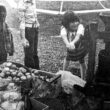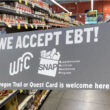I’m sure I’m not the only one to hear lots of mixed reactions to the fact that this year’s Oregon Jamboree is its swan song.
Many who enjoyed volunteering and attending the Jamboree are, not surprisingly, unhappy that the end has come. Others, the ones who tended not to be attendees and had to put up with the noise and the crowds, don’t seem disappointed.
Understandable, but it’s a loss for Sweet Home nonetheless.
Fact is, the Jamboree has been good to us. There’s no question that a lot of money has flowed into Sweet Home on festival weekend as thousands of campers, both those with castles on wheels and those with legs, have converged on us over the years. Their presence has spelled opportunity for local merchants who have been able to cash in on that traffic.
Like other things that we get used to and take for granted, the Jamboree actually was a really big deal. It was a significant accomplishment for a town of less than 10,000 people (34 years ago) to be able to put something of this magnitude together and keep it going for well over 30 years.
Sweet Home’s “git ’er done” personality is a strength, as evidenced by the Oregon Jamboree. But sometimes it takes us a while to get there, and now we have to figure out what’s next.
Former City Manager Kelcey Young’s effort last year to get the SHARE group re-established was a step in that direction (disclaimer: I was personally involved in that myself), but after she abruptly departed that effort was put on hold, at least for the time being.
Whether it be through a brainstorming effort like SHARE or some other means, we need to find what I like to call “critical mass” to figure out what’s next. In any community, but particularly in a smaller one like Sweet Home, the right people have to be in the right place at the right time to make something happen that will endure.
That’s certainly what happened back in 1992 when Marge Geil and Leslie Anke and some others came up with the idea of having a camping festival in Sweet Home.
I’m sure there were naysayers, but they demonstrated the initiative to do something out-of-the-box and it worked, providing succor to a community that had taken it in the chops at multiple levels thanks to circumstances well beyond its control.
While the Oregon Jamboree may not have solved a lot of problems for Sweet Home, it put us on the map and it’s been kind of a shot in the arm for those who have been involved. And it has been fun for a lot of people.
One longtime volunteer, who has devoted literally hundreds of hours of heavy labor into the festival, working long shifts to make concerts happen over the years, told me last week: “When I think of all the time I’ve put in there, I’m not entirely sorry to see it go. But then, again, I am.”
Sweet Home has a lot to offer, which was clear to the founders of the festival. They were looking for answers in difficult circumstances, and they found one that worked pretty well.
Yes, there were costs to the community to have the Jamboree here, but the rewards were there as well – which is true of any successful enterprise.
When I hear comments about the downsides of the festival, or scoffing at the suggestion that we have tourist traffic that we could and should find ways to profit from, one phrase comes to mind: “Familiarity breeds contempt.”
I was in New York City one time, standing in Times Square, and as I looked around it occurred to me: “These people go to national parks on vacation. I live in a national park.”
OK, I was employing a little hyperbole there, but in Sweet Home we look out our windows at mountains and trees – things other people see on their calendars.
Sweet Home had something to offer when the Jamboree started and we still do. We have outdoor recreation galore – trees, trails, lakes, rivers – right outside town. We are strategically located in an area that is within two hours’ drive of our state’s largest metropolitan areas. My window at work faces Highway 20 and I see the campers rolling by all day long, every day when it’s not winter. Other people think we have something to offer.
We also have expertise in putting on events, matured over three decades. We have seasoned volunteers, we have executive types who know the ins and outs, and just because the camping festival model doesn’t cut it any more with the public’s tastes, we should be able to find other ways to play to our strengths.
That’s what they did in 1992 and that’s what we should do now.
I know I’m not the only one thinking about this. We’ve got cards to play with and it would be a pity to just fold our hand.
If our community takes incentive, and mixes in some intelligence, initiative and cooperation, who knows what could be next for Sweet Home?





